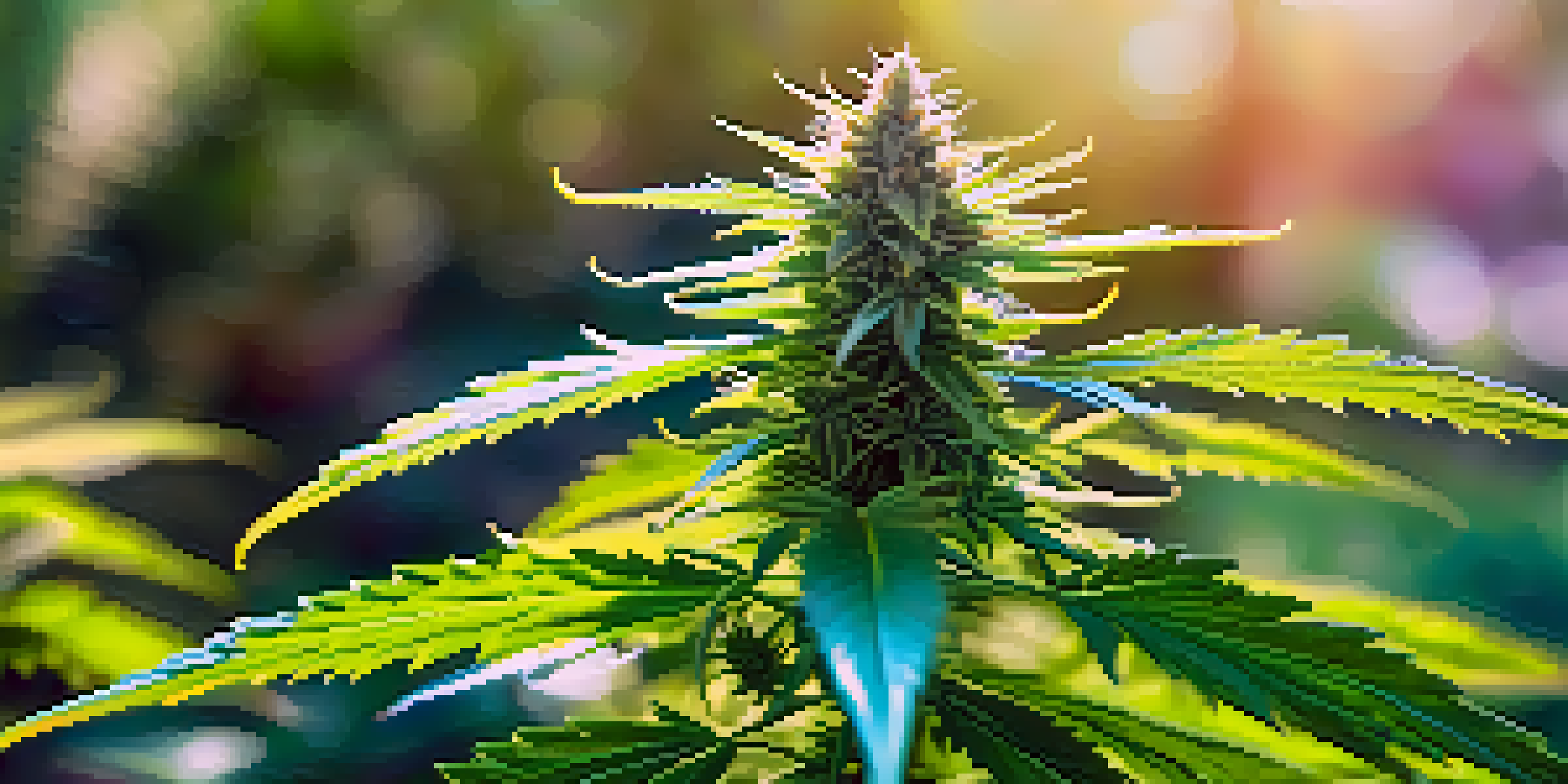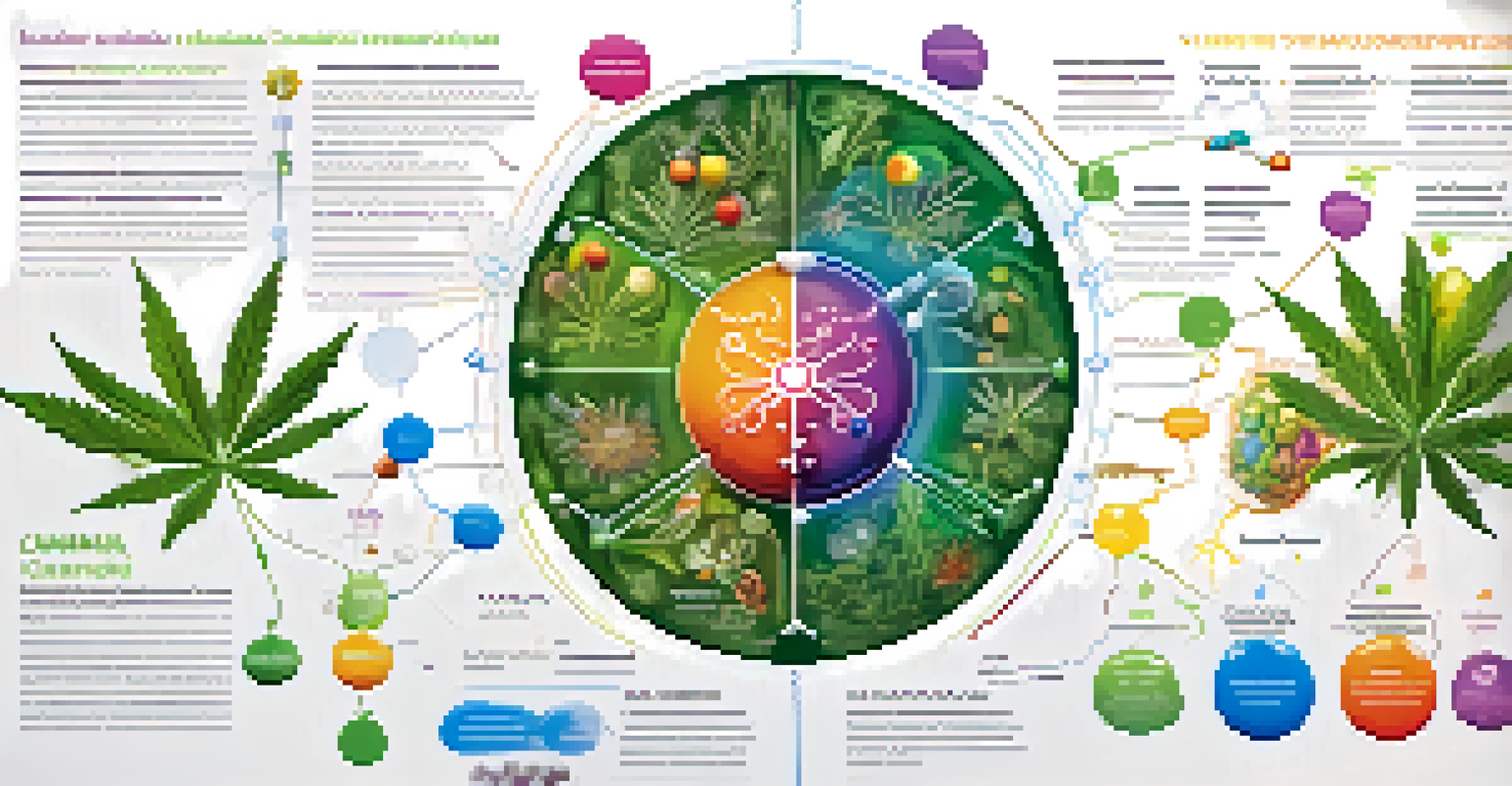Cannabinoids and their Influence on Appetite Regulation

Understanding Cannabinoids: What They Are and How They Work
Cannabinoids are chemical compounds found in cannabis plants. They interact with the body's endocannabinoid system, a complex network that regulates various physiological processes, including appetite. The two most well-known cannabinoids are THC (tetrahydrocannabinol) and CBD (cannabidiol), each affecting the body differently.
Cannabinoids have a unique ability to impact our body's hunger signals, making them valuable in addressing appetite-related challenges.
THC is primarily known for its psychoactive effects, often leading to an increase in appetite, commonly referred to as 'the munchies.' On the other hand, CBD is non-psychoactive and has gained attention for its potential therapeutic benefits without the high. Understanding these compounds helps us explore their impact on hunger.
The endocannabinoid system plays a crucial role in maintaining homeostasis, which includes regulating hunger and satiety. By influencing neurotransmitters, cannabinoids can either stimulate or suppress appetite, depending on the type and dosage used.
The Science Behind Cannabinoids and Appetite Stimulation
Research has shown that THC can activate the CB1 receptors in the brain, which are linked to appetite stimulation. When these receptors are activated, they can enhance the sensory experience of eating, making food more appealing. This is why many individuals report an increased desire to snack after consuming THC.

For instance, studies have indicated that patients undergoing chemotherapy often use THC to combat appetite loss, finding that it not only makes food taste better but also encourages them to eat more. This therapeutic use highlights cannabinoids' potential to support those with appetite-related challenges.
THC Boosts Appetite Effectively
THC activates brain receptors that significantly enhance appetite, making food more appealing, especially for those undergoing treatments like chemotherapy.
It's fascinating to consider how something derived from a plant can have such a profound effect on our body's hunger signals. While THC is the primary player in this area, ongoing research continues to explore how different cannabinoids interact with our appetite-regulating systems.
CBD: A Different Approach to Appetite Regulation
Unlike THC, CBD does not typically stimulate appetite in the same way. In fact, some studies suggest that CBD may help regulate appetite by promoting feelings of fullness. This can be particularly beneficial for those looking to manage their weight or reduce overeating.
Understanding the endocannabinoid system opens up new avenues for therapeutic interventions in appetite regulation.
For example, individuals who use CBD oil may find that it helps them feel satisfied with smaller portions. This contrasts with the effects of THC, providing a balanced perspective on how cannabinoids can influence eating behaviors.
The unique properties of CBD open up discussions on its potential as a weight management tool. As researchers continue to delve into its effects, we may uncover more about how it can support healthy eating habits.
Factors Influencing Cannabinoid Effects on Appetite
Several factors can influence how cannabinoids affect appetite, including individual biology, dosage, and the method of consumption. For instance, a person's unique endocannabinoid system can respond differently to cannabinoids, which can result in varied appetite experiences.
Dosage is another critical aspect; a lower dose of THC might not produce the same hunger response as a higher one. Similarly, the method of consumption—whether it’s smoking, edibles, or oils—can alter how quickly cannabinoids enter the bloodstream and affect appetite.
CBD May Curb Overeating
CBD appears to promote feelings of fullness, potentially aiding in weight management by helping individuals feel satisfied with smaller portions.
Understanding these variables is essential for anyone looking to use cannabinoids for appetite regulation. Personalized approaches may yield the best results based on individual preferences and responses.
Potential Therapeutic Applications of Cannabinoids
The appetite-stimulating effects of cannabinoids have led to their exploration in various medical applications. Conditions such as cancer, HIV/AIDS, and eating disorders often result in significant appetite loss, and cannabinoids may provide relief in these cases.
For instance, many doctors prescribe synthetic THC products to help patients regain their appetite during treatment. This illustrates how cannabinoids can bridge the gap between medical needs and dietary challenges, providing a holistic approach to patient care.
As research progresses, we may see an increase in cannabinoid-based therapies aimed at appetite regulation, potentially transforming how we address these issues in healthcare.
The Risks and Considerations of Using Cannabinoids
While cannabinoids can be beneficial, there are potential risks and side effects to consider. THC can lead to increased anxiety or paranoia in some users, which may deter them from using it as an appetite stimulant. Understanding personal limits and responses to cannabinoids is essential.
Moreover, the legality and purity of cannabis products vary widely, which can impact safety and effectiveness. Consumers should be cautious and seek out reputable sources to ensure they are using high-quality products.
Personal Factors Affect Cannabinoid Use
Individual biology, dosage, and consumption methods can greatly influence how cannabinoids affect appetite, highlighting the need for personalized approaches.
It's crucial to consult with a healthcare professional before starting any cannabinoid regimen, especially for individuals with underlying health conditions or who are taking other medications.
Future Research Directions on Cannabinoids and Appetite
The field of cannabinoid research is rapidly evolving, with new studies constantly emerging. Future research may focus on how different strains of cannabis affect appetite, as well as the long-term impacts of cannabinoid use on eating behaviors.
Additionally, understanding the role of the endocannabinoid system in appetite regulation could lead to new therapeutic targets. Researchers may explore how to manipulate this system to create more effective treatments for those struggling with appetite issues.

As we learn more about cannabinoids and their effects, the potential for innovative applications in appetite regulation continues to grow, promising exciting developments in both health and wellness.